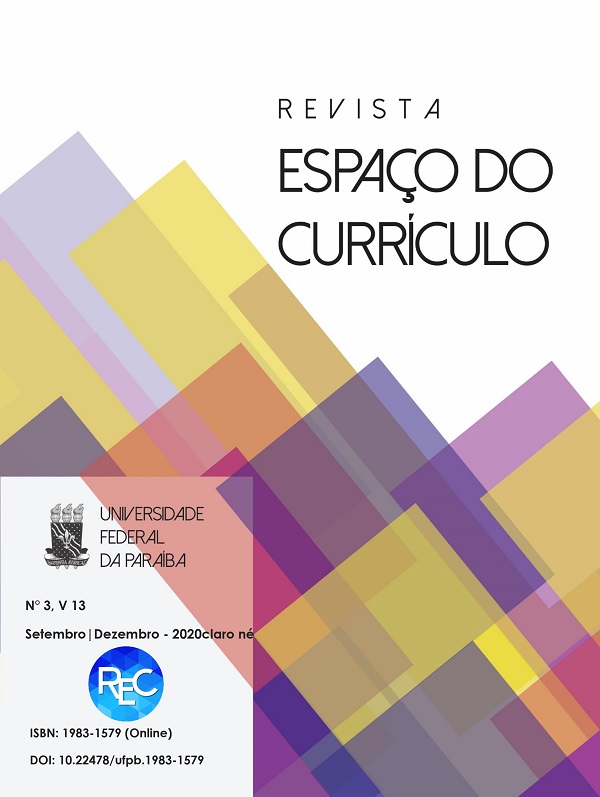“DE VOLTA PARA O FUTURO”
historical education and curriculum in a time to remember
DOI:
https://doi.org/10.22478/ufpb.1983-1579.2020v13n3.50069Keywords:
History, History curriculum, Historical education, Autobiographical narrativesAbstract
To what extent does changing understanding of the past impact on the future? Much more than a rhetorical question, this question is on the agenda. In times of potent displacement in the field of education, either by the implementation of new public policies in Brazil, such as the BNCC, or by the profound reinventions of the very concept of education and the emergence of an official discourse that repeatedly weakens the school institution and the figure of the teacher, is it still possible to talk about history at school? And if the subject is history, what story is the basic education curriculum talking about? This essay, which seeks to reflect on the contemporary history curriculum in basic education, addresses the limits and possibilities brought by historical education, as well as the potential that it presents to contribute to an emancipatory and transformative history. If, on the one hand, we are inserted in a scenario of dismemberment, and, on the other hand, the utopian desire to try to fix the impossible is constituted as something belonging to the human being, it becomes increasingly relevant to redefine the study of the past within school institution. And in this way, turn our eyes “back to the future”.
Downloads
Metrics
References
APPLE, Michael. A política de conhecimento oficial: faz sentido a ideia de um currículo nacional? In: MOREIRA, Antonio Flavio; SILVA, Tomaz Tadeu da. (Org.). Currículo, cultura e sociedade. São Paulo: Cortez, p. 59-91, 2002. Tradução Maria Aparecida Baptista.
BITTENCOURT, Circe Fernandes. Reflexões sobre o ensino de história. Estudos Avançados. USP, v. 32, n.93, p. 127-149, 2018.
BRASIL. Base Nacional Comum Curricular (BNCC). Brasília: MEC. 2017. Disponível em: <http://basenacionalcomum.mec.gov.br/>. Acesso em 11/12/2019.
CARVALHO FILHO, Roper Pires de. Ensino de História: políticas curriculares, cultura escolar, saberes e práticas docentes. Tempo e Argumento. Revista do Programa de Pós-Graduação em História da UDESC. Florianópolis, v. 4, n.2, p 82-101, jul./dez. 2012.
CUNHA, Jorge Luiz da. Educação histórica e narrativas autobiográficas. Educar em Revista. Curitiba, Brasil, v. 35, n. 74, p. 93-108, mar./abr. 2019.
HARARI, Yuval Noah. 21 lições para o século 21. 1ª edição. São Paulo: Companhia das Letras, 2018. Tradução Paulo Geiger.
LEE, Peter. Literacia histórica e história transformativa. Educar em Revista. Curitiba: Brasil, n. 60, abr./jun. 2016, p. 107-146. Tradução Lucas Pydd Nechi e Tiago Sanches.
PEREIRA, Nilton Mullet. O ensino de história e o presente. Revista Ágora. Santa Cruz do Sul, v. 13, n. 1, p. 151-166, jan./jun. 2007.
PEREIRA, Nilton Mullet; SEFFNER, Fernando. Ensino de História: passados vivos e educação em questões sensíveis. Revista História Hoje. Rio de Janeiro, v. 7, n. 13, p. 14-33, 2018.
RÜSEN, Jörn. História viva. Teoria da história III: formas e funções do conhecimento histórico. Brasília: Editora Universidade de Brasília, 1ª reimpressão, 2010. Tradução Estevão de Rezende Martins.
RÜSEN, Jörn. Experiência, interpretação, orientação: as três dimensões da aprendizagem histórica. In.: SCHMIDT, Maria Auxiliadora Moreira dos Santos; BARCA, Isabel; MARTINS, Estevão de Rezende (org.). Jörn Rüsen e o ensino de história. Curitiba: Ed. UFPR, 1ª reimpressão, 2011, p. 79-91.
RÜSEN, Jörn. Teoria da história: uma teoria da história como ciência. Curitiba: Editora UFPR, 1ª reimpressão, 2016. Tradução Estevão de Rezende Martins.
SCHAFFNER, Fábio. Aliança pelo Brasil: em 4 mil palavras, o bolsonarismo é expressado no novo partido. GaúchaZH, Política. 22/11/2019. Disponível em: <https://gauchazh.clicrbs.com.br/politica/noticia/2019/11/alianca-pelo-brasil-em-4-mil palavras-o-bolsonarismo-e-expressado-no-novo-partido-ck3ax5j5q046j01phdurgo1yd.html.>.
Acesso em 11/12/2019.
SCHIMITT, Jaqueline Zarbato. Currículo e ensino de história: diálogos sobre prática de ensino e o processo de formação de professores. Revista do Lhiste. Porto Alegre, n.2, v. 2, p. 103-117, jan./jun. 2015.
SOBANSKI, Adriane de Quadro; CARAMEZ, Claudia Senra. Educação histórica e o professor como investigador social. In.: SCHMIDT, Maria Auxiliadora; URBAN, Ana Claudia (org.) O que é Educação Histórica. Curitiba: W. A. Editores, 2018 (Coleção Educação Histórica), Volume 1, p. 119-138.
Downloads
Published
How to Cite
Issue
Section
License
By submitting an article to Curriculum Space Journal (CSJ) and having it approved, the authors agree to assign, without remuneration, the following rights to Curriculum Space Journal: first publication rights and permission for CSJ to redistribute this article. article and its metadata to the indexing and reference services that its editors deem appropriate.
















